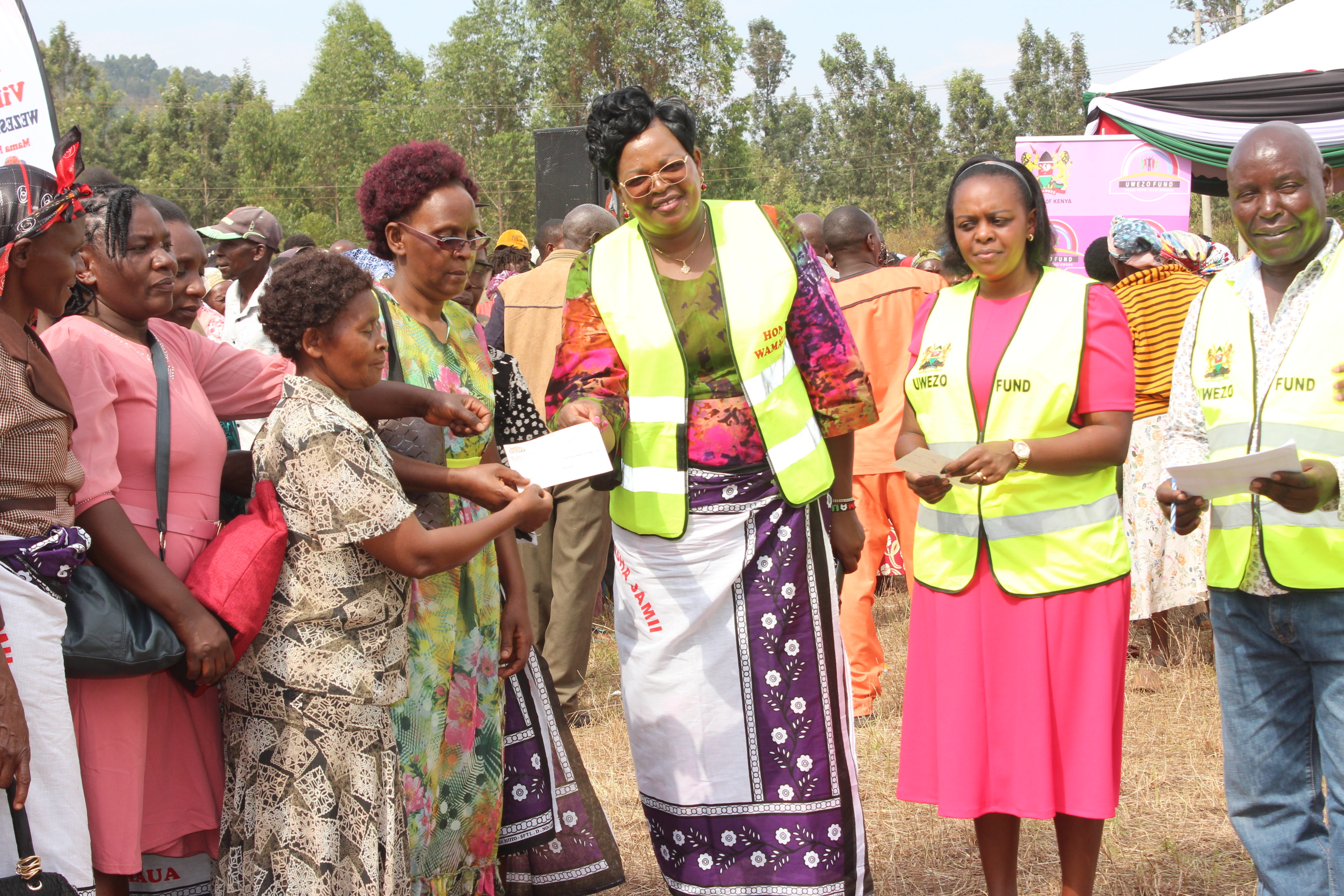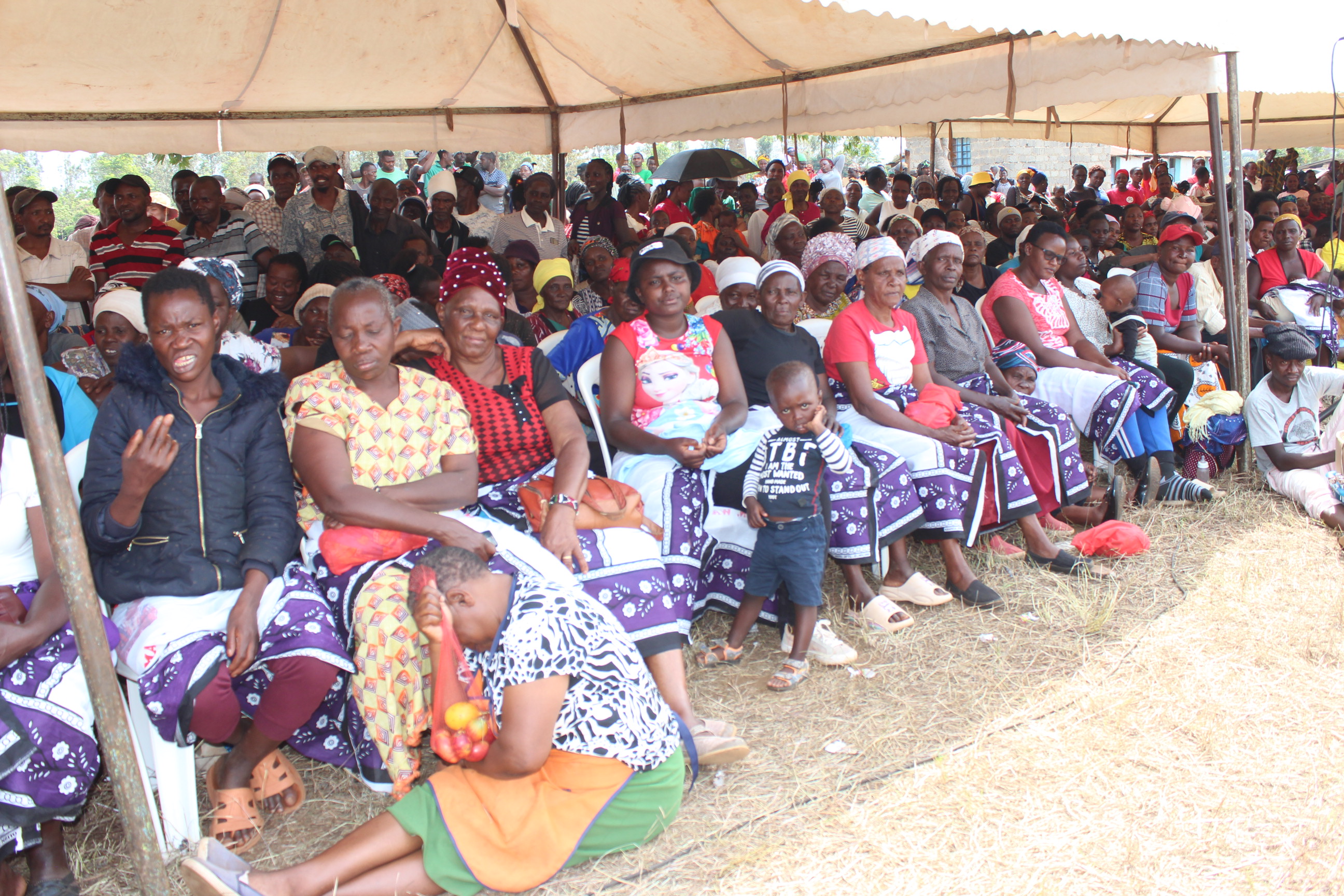
 Maragua MP Mary Waithera and Uwezo Fund chairperson Anne Njuguna issue cheques during an empowerment drive in Kamahuha on October 4, 2025.ALICE WAITHERA
Maragua MP Mary Waithera and Uwezo Fund chairperson Anne Njuguna issue cheques during an empowerment drive in Kamahuha on October 4, 2025.ALICE WAITHERAWomen and youth groups have borrowed more than Sh5 billion from Uwezo Fund, chairperson Anne Njuguna has announced.
She said the funds have been instrumental in strengthening grassroots economies as beneficiaries start and expand income generating activities.
Speaking at Igikiro grounds during the issuance of Sh7.2 million cheques in Maragua constituency, Njuguna said most benefiting groups have been thriving, with a huge uptake reported in most parts of the country.
The fund that was started by the government in 2013 charges no interest, and groups are required to start remitting repayments after a grace period of six months.
Njuguna explained that new groups are issued with Sh50,000 loans, which are then doubled after successful repayment.
"Groups are doing very well and we have seen an improvement in repayments after sensitisation," she said.
The chairperson encouraged more groups to consider applying for the funds, saying the kitty was established to empower the vulnerable, women and youths.
Njuguna hailed Maragua residents for making efforts to repay the loans in good time, with a repayment rate of 81 per cent.
She said, however, Northeastern has been lagging in uptake and repayment of the funds, but noted an improvement has been recorded in recent years.
"It's very important that groups repay this money so that more can benefit. This is a revolving fund and we have seen it improve livelihoods and society welfare," she added.
Maragua MP Mary Waithera said many of the groups are made up of women who have started poultry, pigs, fish, cattle farming and table banking.
"This is a major empowerment forum and these groups are given one year and one and a half years to repay the loans".
 Maragua residents during an empowerment forum at Igikiro on October 4, 2025./ALICE WAITHERA
Maragua residents during an empowerment forum at Igikiro on October 4, 2025./ALICE WAITHERAWhen she was elected in 2017, Waithera said many of the groups were defaulting but that her office collaborated with local administrators to enlighten them on the need to pay it back.
Last year, another Sh5.4 million was
disbursed to groups, saying other government kitties such as the National
Government Affirmative Action Fund (NGAAF) that’s domiciled at the Woman
Representative’s office have also been monumental in supporting grassroots
economies through establishment of income generating activities.
She defended the empowerment drive being spearheaded by Deputy President Kithure Kindiki, saying it’s strengthening
women and youth groups despite criticism by some Kenyans.
In Maragua, a similar drive held earlier in the year saw
Sh8.7 million contributed and donated to 87 women and youth groups, each getting
Sh100,000.
“We are happy the government is supporting empowerment
of groups. Such money boosts their activities and enables families to support
themselves”.
One of the benefiting groups, Karia-ini-Thayu Self Help
group, received Sh50,000 as the first loan from Uwezo fund.
Vice chairperson Eliud Mwaura said the group was started in
2015 as a merry-go-round after which they expanded it into a welfare
improvement platform through which members were supported to pay dowry for
their partners.
“We then started contributing Sh50 every time we met and now
that has risen to Sh2,000 for each member. This money is used to offer soft
loans to members. If you borrow Sh1,000, it attracts an interest of Sh100 every
month,” he explained.
The loan from Uwezo fund will ensure members access higher
loans that will enable them to support themselves more.
Pamoja Kayole group also received Sh50,000, with member
Esther Mwihoko saying the group has made it possible for members to pay for
their children’s education without too much struggle.
“Previously, even raising Sh200 was an issue for many of us
but with the group, we’re able to get cheap loans and grow together,” she
added.
The group has since started poultry keeping projects for all 10 members with a ready market provided by the vibrant hospitality industry in Kenol town.













![[PHOTOS] Betty Bayo laid to rest in Kiambu](/_next/image?url=https%3A%2F%2Fcdn.radioafrica.digital%2Fimage%2F2025%2F11%2F3b166e2e-d964-4503-8096-6b954dee1bd0.jpg&w=3840&q=100)

![[PHOTOS]Goons vandalise Nargis Restaurant in Westlands](/_next/image?url=https%3A%2F%2Fcdn.radioafrica.digital%2Fimage%2F2025%2F11%2Fa1c98f6c-2b1d-4b50-b112-1def4d93a193.jpeg&w=3840&q=100)

